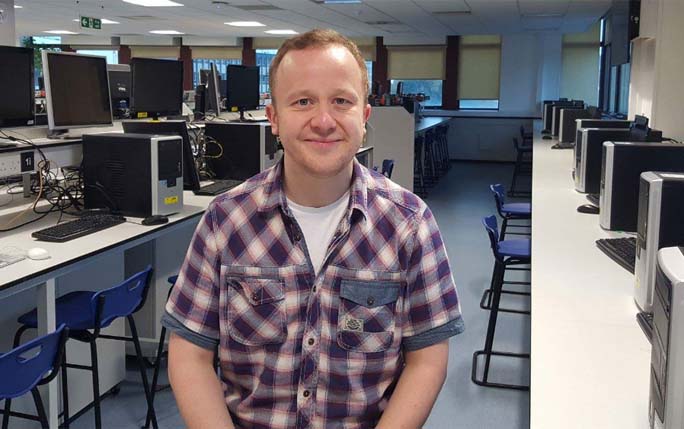Scholarships in profile: Paul Gainer (BSc Hons Computer Science 2015)

Thanks to the Sir Joseph Rotblat Alumni Scholarship, PhD student, Paul Gainer, is conducting research to prove that robot swarms can be safe and reliable.
You chose to come to Liverpool as a mature student - what prompted that decision?
I’d worked for many years in a variety of different job roles; from handling customer complaints at a bank to operating rides at a safari park! At the age of 31 I decided that I needed new direction in my life and applied to study at the University of Liverpool.
Why did you want to study computer science?
Computers and their applications piqued my interest during my early teenage years, and I was eager to learn more about this subject that had intrigued me for so long. I applied for university aiming to pursue a career in software development, however during my second year of undergraduate study I became very interested in the underlying theory and principles of the subject. Liverpool’s Computer Science department is widely regarded as one of the UK’s foremost centres for research excellence, and is a world leader in developing and applying temporal formal verification methods, so I decided I would like the opportunity to contribute to that reputation.
How would you describe your research project?
Robot swarms are groups of simple robots that work together to achieve a specific task. There are many potential real-world applications for swarm technologies, most notably in post-disaster relief. Due to safety and reliability considerations, the industrial application of these technologies is low. My project aims to develop techniques that can help to prove that swarm systems can safely and reliably achieve their objectives.
Have you always been interested in robotics?
Yes; I’ve always been fascinated by robots in both literature and the real world. I look forward to being able to contribute towards ongoing research that aims to introduce more robots into society to help improve our quality of life.
What are the potential uses/findings of your research?
Proving the 'correctness' of swarms, with regard to their expected behaviours, is currently only feasible when relatively small numbers of robots are studied. Developing new techniques that can be used to verify the behaviour of much larger swarms will help to increase their safety and reliability, facilitating their deployment from the laboratory into the real world.
What does it mean to you to be supported by the Sir Joseph Rotblat alumni scholarship?
The Sir Joseph Rotblat Alumni scholarship will help to alleviate my financial burden over the coming years, allowing me to concentrate fully on my doctoral research. I am very grateful for this opportunity and would like to express my sincerest thanks and appreciation to donors.
What are your plans for the future?
I am aiming to pursue a career in academia and research on completion of my doctorate.
To find out more about supporting our postgraduate student, please click here.